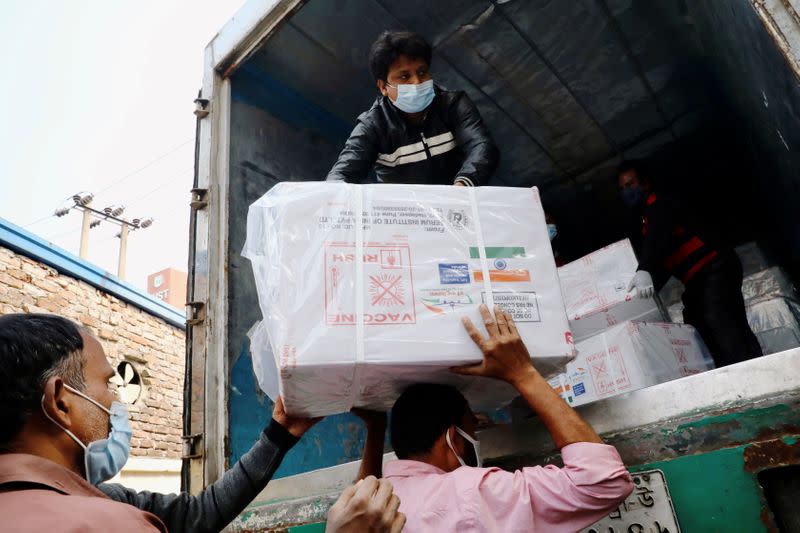By Sanjeev Miglani and Gopal Sharma
NEW DELHI / KATHMANDU (Reuters) – India will give millions of doses of COVID-19 vaccine to South Asian countries in the next few weeks, government sources said on Thursday, praising its neighbors and pushing back against China’s dominant presence in the region. .
Free deliveries of the AstraZeneca vaccine manufactured by the Serum Institute of India, the world’s largest producer of vaccines, have started arriving in the Maldives, Bhutan, Bangladesh and Nepal.
Myanmar and the Seychelles are next in line to get free shipments, as India uses its power as one of the largest manufacturers of generic medicines in the world to build friendships.
“The Government of India has shown goodwill by granting the vaccine. It is at the level of people, it is the public that suffers the most under COVID-19,” said Hridayesh Tripathi, Minister of Health and Population in Nepal.
The gesture comes at a time when India’s ties with Nepal are strained by a territorial dispute and the Indian concern over China’s growing political and economic influence in the Himalayan nation built among the Asian giants.
China, which has promised Nepal aid to deal with the pandemic, is awaiting Nepalese clearance for its Synopharm shots.
“We asked them to submit more documents and information before approving it,” said Santosh KC, spokesperson for the Department of Drug Administration in Nepal.
CHINESE RIVALRY
Bangladesh had to get 110,000 doses of vaccine for free from the Chinese firm Sinovac Biotech, but Bangladesh refused to contribute to the development cost of the vaccine which led to a stalemate.
Bangladesh had instead turned to India for urgent supplies and would have received 2 million shots of the AstraZeneca vaccine as a gift from India on Thursday.
“India makes the AstraZeneca vaccine, which makes the biggest difference. It can be stored and transported at normal refrigeration temperatures, and countries like Bangladesh have the facility,” a Bangladeshi health official said.
Meanwhile, India’s arch-enemy, Pakistan, on Thursday thanked China, its close strategic ally, for its promise to provide half a million doses of the vaccine free of charge by the end of the month.
India has been struggling for years to adjust the pace of Chinese investment in countries such as Sri Lanka, Nepal and the Maldives, where China is building ports, roads and power stations as part of its Belt and Road Initiative.
But the demand for vaccines in these countries, which are desperate to revive their tourism-dependent economies, has offered the government, Prime Minister Narendra Modi, a way to pull the ground back, diplomats say.
India is considering giving away anything from 12 to 20 million shots to its neighbors in the first wave of aid over the next three to four weeks, one government source said.
India is also helping with the training of health workers in some of these countries and the establishment of the infrastructure to administer the shots, the source said.
“This is a well-crafted, calibrated series of actions that you see, it confirms the validity of our ‘first’ neighborhood policy,” said former Indian Ambassador Rajiv Bhatia.
“It plays out according to our strengths in the science and pharmaceutical environment, and this is our moment to shine.”
(Reporting by Sanjeev Miglani and Gopal Sharma in Kathmandu; Additional reporting by Ruma Paul in Dhaka and Umar Farooq in Islamabad; Edited by Robert Birsel and Gareth Jones)
